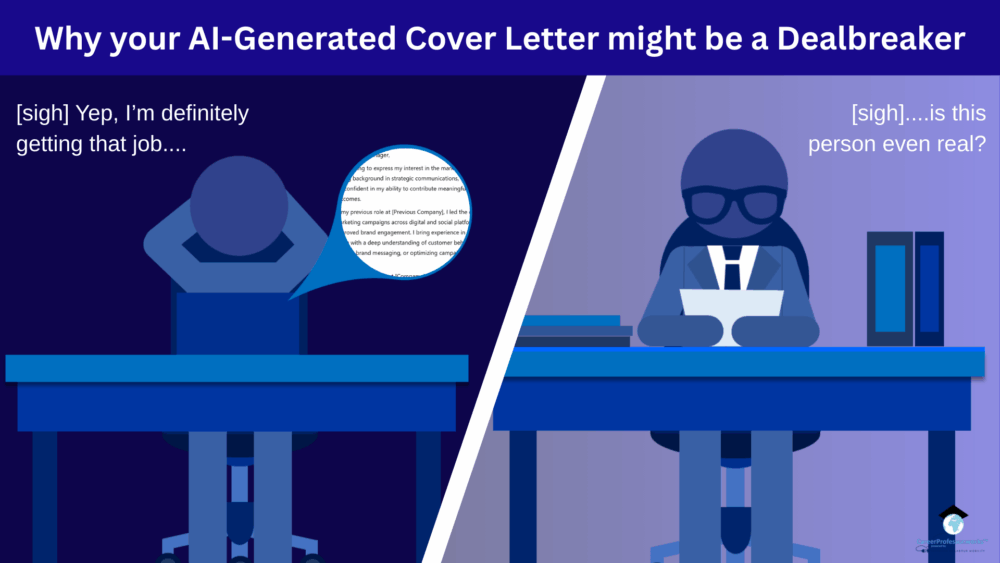
Why Your AI-Generated Cover Letter Might Be a Dealbreaker
Sensible use of AI
Whilst navigating the job market and trying to make sense of all the different steps of a job application, it is easy to be flooded with content on how to draft the ‘perfect’ cover letter and how to leverage AI to save some time and effort. The appeal of generative AI is undeniable. It is as easy as uploading your CV, entering the job title of interest, and pasting the requirements listed in the vacancy. With just a few clicks, AI will generate countless cover letters and tailor them to specific job postings… So why spend hours trying to do it yourself?
As a student trying to juggle multiple commitments, it may be tempting to rely on AI to ‘simplify’ the application process. This seems particularly true when applying to multiple positions at a time, with graduation approaching, and the shadow of the future starting to weigh on your shoulders. But simpler and quicker does not always mean better or more effective. This is what emerged during my conversation with Nannette Ripmeester, Director of Expertise in Labour Mobility, with extensive knowledge of employability and passionate about bridging the gap between recent graduates and their future job opportunities.
Why authenticity matters: hiring people, not tools
Ripmeester has recently noticed a sharp increase in AI-generated cover letters. While she acknowledges that AI can be a useful assistance tool, she warns against its use as a ‘creator’ tool. “If you need to rely on AI to tell me why you are competent… how competent are you actually?” she asks. This sentiment reflects a broader concern among employers: AI-generated cover letters sound polished but lack authenticity.
One of the most significant pitfalls of AI-generated cover letters is that they often sound too perfect and, ironically, that perfection raises red flags. Many recruiters are increasingly sceptical of cover letters that appear flawless. One recruiter comments that “all cover letters received nowadays are excellent, which is not surprising, since they are all generated or polished by AI.” A major problem lies in the uniformity that AI tends to produce. With similar phrasing and repetitive and generic buzzwords, instead of standing out, these cover letters blend into a sea of identical applications. This uniformity almost suscitates an anti-reaction, where recruiters perceive such letters as disingenuous.
While seemingly perfect and extravagantly worded AI cover letters might sound impressive at first glance, they fall flat when scrutinised. Ripmeester points out that these letters often lack the authentic lived experience of a candidate that recruiters are actively trying to identify and fail to provide concrete evidence of a candidate’s suitability for the position. The old saying that actions speak louder than words seems to ring especially true here. “What actually reinforces your cover letter is not just strong words, but your actual lived experience. And only you can add that,” Ripmeester underlines.
A strong candidate is not someone who merely claims to be one, but one who can demonstrate it by linking skills to experiences. When AI exaggerates an applicant’s abilities, and the candidate is invited to an interview where they fail to live up to those claims, some recruiters could be left with a bad taste in their mouth, questioning the credibility of the entire application. The key to making a cover letter stand out seems to lie in candidates’ ability to reflect on where job requirements and their competences overlap and their personal touch, something that AI might struggle to replicate.
The future of AI in job applications
The observed overuse of AI in job applications may eventually force companies to change their hiring processes altogether. If every applicant submits an AI-generated cover letter, the value of cover letters themselves could diminish. “We might as well get rid of them if everybody presents perfectly generated letters and we are unable to identify good candidates,” Ripmeester speculates. Ironically, the widespread reliance on AI could make future application processes more, certainly not less, demanding, as recruiters introduce new ways to assess candidates beyond written applications.
Ultimately, AI should be used wisely. It can surely help structure a cover letter or refine language, but it should never replace personal input. An effective and authentic letter not only lists skills that applicants possess but also shows employers who they are. At the end of the day, employers want to hire the real person behind the letter, not an inexistent AI-generated persona. “Otherwise,” Ripmeester states, “I might just ‘hire’ that AI tool, which may be able to do (part of) the job and, let’s not forget, is not only quick, but also super friendly in the interaction.”
Curious to know what this means when writing a CV? Click here. And if you want to know how students use and perceive AI, click here.
Blog post written by Yerin Park for Expertise in Labour Mobility
Image by Jizelle Ys for Expertise in Labour Mobility
© 2025Expertise in Labour Mobility. All Rights Reserved.
